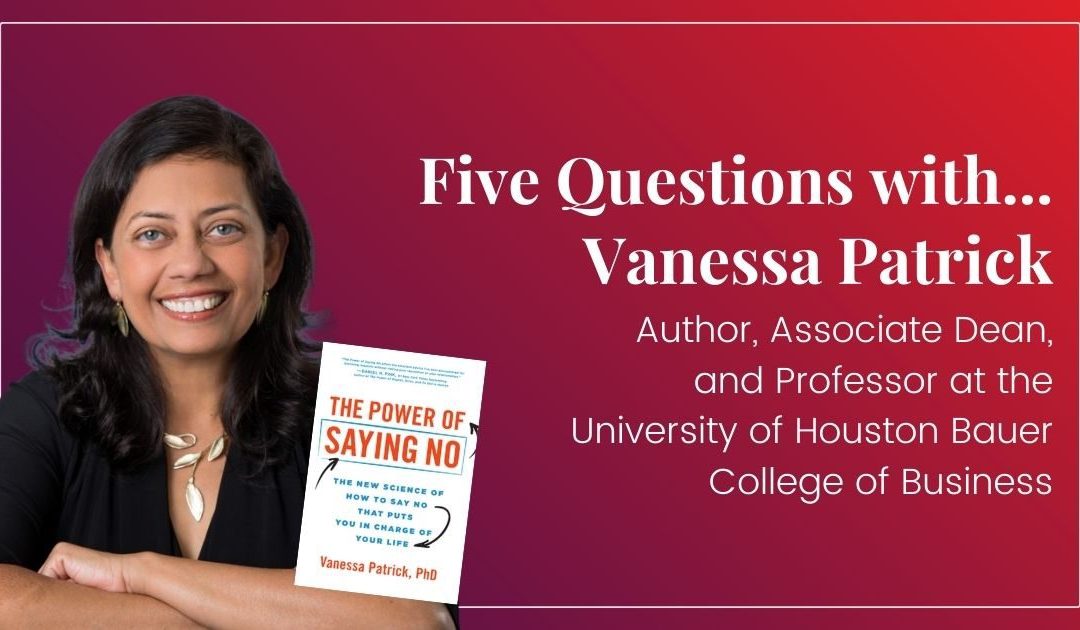This month we asked WiBE Member Vanessa Patrick, Associate Dean for Research and Bauer Professor of Marketing, about her book The Power of Saying No:
Q: What inspired you to write The Power of Saying No, and what message do you hope readers will take away from it?
It has been a decade or so since I coined the phrase “empowered refusal” in my research. Empowered research is a way of saying no that is persuasive and does not elicit pushback from the asker. Although, we did not realize it at the time, it turned out that knowing how to say no more effectively was something people really wanted to know about! In the months that followed the publication of those research articles, a whole host of media outlets – New York Times, LA Times, Huffington Post and the WSJ – covered our empowered refusal work. This is when the seed for the book was first sowed. I clearly saw that there was a need to learn how to say no, and my research could shed light on the matter.
I am a marketing professor and marketing is an activity whose goal is to create value. It is with this systematic value-creation mindset that I wrote the book. My first step was to develop executive education course for our Women in Leadership program that allowed me to test-drive my ideas with the core audience. After five years of teaching these executive classes, I decided that I was ready to share more deeply my knowledge of, and passion for, empowered refusal, in the form of this book.
Empowered refusal is a way of saying no that puts you in the driver’s seat of your own life. The key message in the book is for readers to learn to say no to things that come in the way of them living their best possible life. I outline a set of three competencies that need to be developed to master the A.R.T. of empowered refusal – deepened self-awareness, systems that are geared towards productivity and well-being and the need to utilize effective verbal and non-verbal communications.
Q: Who do you think would benefit the most from reading this book, and why?
So many of us struggle to say no to things that come our way. My research shows that if you are a woman, especially one in a position of some authority who has valuable resources at your disposal, you get a lot of asks coming your way. On a daily basis you are asked to take on a project, do a favor, to attend a meeting or event that for one reason or another you really do not want to take on or simply don’t have the bandwidth for. Yet, you struggle with how to say no to these constant demands. If you have too much on your plate, and no time or energy to do those things, then you need to master the A.R.T. of empowered refusal. I wrote this book for you!
Q: What was the most challenging part of writing this book, and how did you overcome any obstacles you faced?
This book was a significant endeavor. I wrote it on top of my administrative and teaching responsibilities. Perhaps my biggest challenge was walking the line between research and practice in what I wrote and how I wrote it. I wanted the book to be grounded in research, yet filled with practical (albeit research-based) insights and be accessible and easy to read. I hope I have succeeded in this objective! You, my readers, can be the best judge of that!
Q: What is the most surprising or interesting thing you learned while researching or writing this book?
That writing a book takes a village. In the book I discuss the concept of marigolds (those lovely people who nurture and help us on our life’s journeys) and I have thanked many of them in the acknowledgement section of the book (including our fabulous Lisa Leander!). Although I wrote the words, it took a team to get a book out into the world. Overall, I feel so grateful for the amazing support I have received.
Q: What are your future plans or projects?
One of the best books I read in the last few years is From Strength to Strength by Arthur C. Brooks. It inspired me to think about how I want to develop my academic career by jumping off the fluid intelligence curve and onto the crystalized intelligence curve. Given the importance I place on research, I would like to continue to explore opportunities to bridge the gap between research and the real-world with rigor and relevance. I do think I have another book or two inside me. I am certainly open to the opportunities that will come my way and I have a specific purpose-filled lens with which I will decide which ones get a resounding yes and which ones will get an empowered no!

